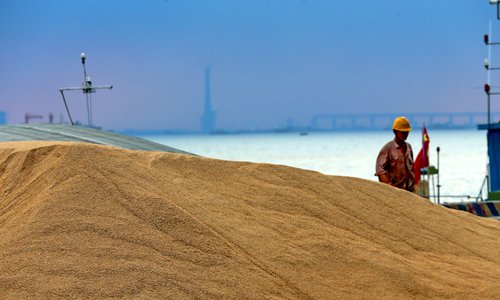HOME >> BUSINESS
China ready to whittle down US soybean imports
By Chen Qingqing and Shen Weiduo Source:Global Times Published: 2019/6/2 20:23:40
Escalating trade war will eventually hurt American farmers more: insiders

Imported soybeans seen at a port in Nantong, East China's Jiangsu Province in August, 2018. Photo: IC

A crane vehicle loads imported soybeans onto a cargo boat at a port in Nantong, East Chinas Jiangsu Province in August 2018. Photo: IC
China is capable of ensuring agricultural product supply in its domestic market while seeking replacements for US imports amid the escalating trade war. American farmers will eventually pay the price for Washington's unilateral act of raising tariffs on Chinese goods, industry representatives said.
Faced with escalating trade friction, China is capable of ensuring agricultural product supply, laying a solid foundation for the country's economic growth, Vice Minister of Agriculture Han Jun was quoted as saying in a news report on Saturday.
"The US agriculture sector is now bearing significant losses due to its government aggressive policy, as it's losing the most important trading partner for agricultural products," he said.
In the first quarter of 2019, exports of American agricultural products to China slumped 60 percent, and American soybean exports to China plunged 80 percent, both on a year-on-year basis, the report said.
China has come up with countermeasures against the US, which covered almost all US agricultural exports to China, Han noted.
"Now, American farmers have to deal with high inventories and shrinking revenues. If the situation gets worse, US agriculture will be hit very badly," the vice minister said.
US farmers are getting frustrated and even feeling helpless, as China has reportedly put new purchases of US soybeans on hold while US President Donald Trump is playing hard to get in negotiations with China, by threatening more tariffs on Chinese goods.
China, as the largest soybean buyer, has not placed any further orders to buy US soybeans, Bloomberg reported on Thursday, citing unidentified sources.
As tensions peaked, soybean futures in Chicago slumped to a 10-year lower earlier in May and US farm incomes dropped 16 percent last year, due to the trade war with China and losses from spring flooding, according to the report.
"I've asked my US counterparts many times why the US government ignores the strong call of US farmers and industry associations, and stubbornly hurts the interests of agricultural industries of both sides," Cao Derong, president of the China Chamber of Commerce of Import/Export of Foodstuffs, Native Produce and Animal By-products (CFNA), said during a high-end seminar held in Beijing on Friday.
"Their answers are the same," he said, noting that US industry representatives always consider China as one of the US agricultural products' most important markets and they always oppose the US government's wrong decision.
CFNA is China's largest agricultural international trade organization, has more than 6,000 member enterprises which generated more than half of China's total agricultural imports, according to Cao.
While American farmers struggle with the collapse in exports, China will see a limited impact from reducing American soybean imports.
"For the moment, we have adopted various measures to ensure soybean supply on the home market including expanding domestic soybean product and planting areas, improving feed formulas and increasing imports from Russia and South American countries," Han said.
Fully prepared
The soybean planting area in Northeast China's Heilongjiang Province, the main producer of the crop in China, is expected to reach 580 million mu (38.6 million hectares) in 2019, a year-on-year increase of 5 million mu, said Wang Jinhui, director of the Agricultural and Rural Affairs Department of Heilongjiang Province, the Economic Daily reported in April.
"The remarks show that China has the confidence and ability to cope with the possibility that the two countries' agricultural ties might deteriorate further amid an escalating trade war," Jiao Shanwei, editor-in-chief of cngrain.com, a website specializing in grain news, told the Global Times on Sunday.
Jiao said that in recent years, China has found more import sources to reduce agricultural reliance on the US. For instance, China imported more corn from Ukraine and more wheat from countries like Kazakhstan and Australia.
"The fact is, China is not relying as much on the US in the agriculture sector as people think," Jiao said.
Agricultural products shipped from the US to China declined over 32 percent since 2018 to the level of 10 years earlier, even as China's agricultural imports reached a record high of $136.7 billion in 2018, Cao noted during the seminar.
The declining trend continued in the first quarter of 2019, with the number further decreasing by 68.7 percent. Imports of soybeans, cotton and corn decreased by more than 50 percent, according to Cao.
"The US initiated a tariff war against China that will only hurt consumers, farmers and enterprises on both sides, and it will lead nowhere," Jiao said, adding that only cooperation will bring benefits for all, and the rule also applies to China and US.